|
In the 1980s Mokae came with some of his best roles in
films, particularly The Serpent and the Rainbow and A Dry White Season.
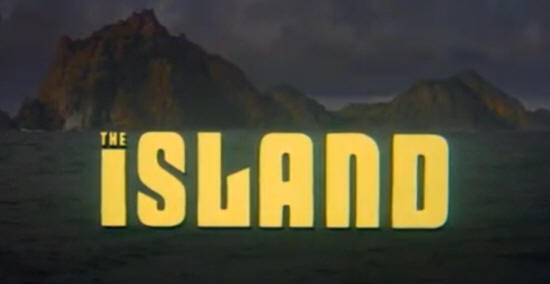
The Island directed by Michael Ritchie in 1980. Ritchie did at
least one good film, The Candidate with Robert Redford, but this is
not one of his successes. The film stars Michael Caine as Blair
Maynard taking his son on holiday. A Peter Benchley (he wrote the novel Jaws) story about
pirates, very poor.
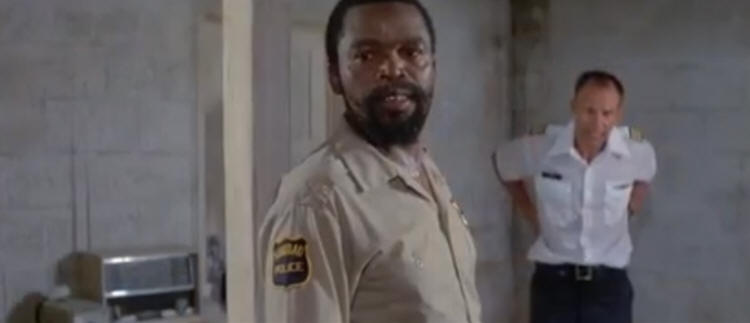
Caine´s plane crashes when landing on an island and
policeman Westcott (Zakes Mokae) cycles up and insists on collecting the landing
tax.
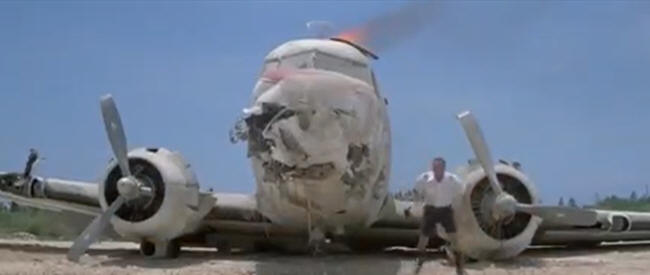
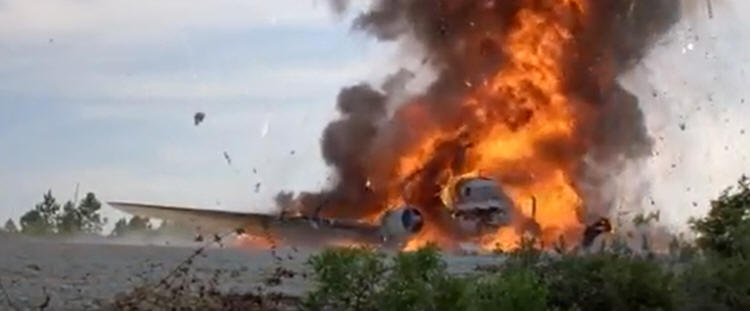
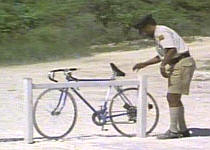
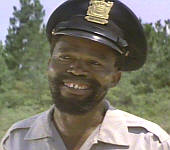
Caine and his son move to their hotel, but are captured by pirates who
live away from the rest of the world in their own colony.
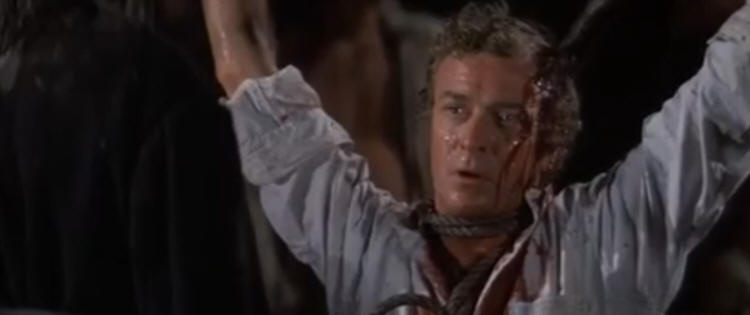
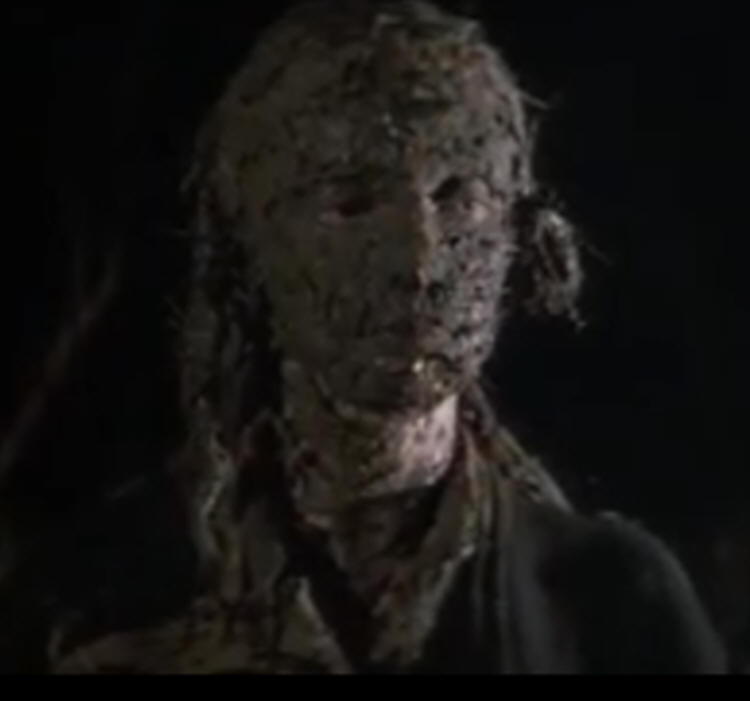
Caine ends up forcibly partnered to a pirate woman (Angela Punch
McGregor) who, not surprisingly, none of the pirates want.
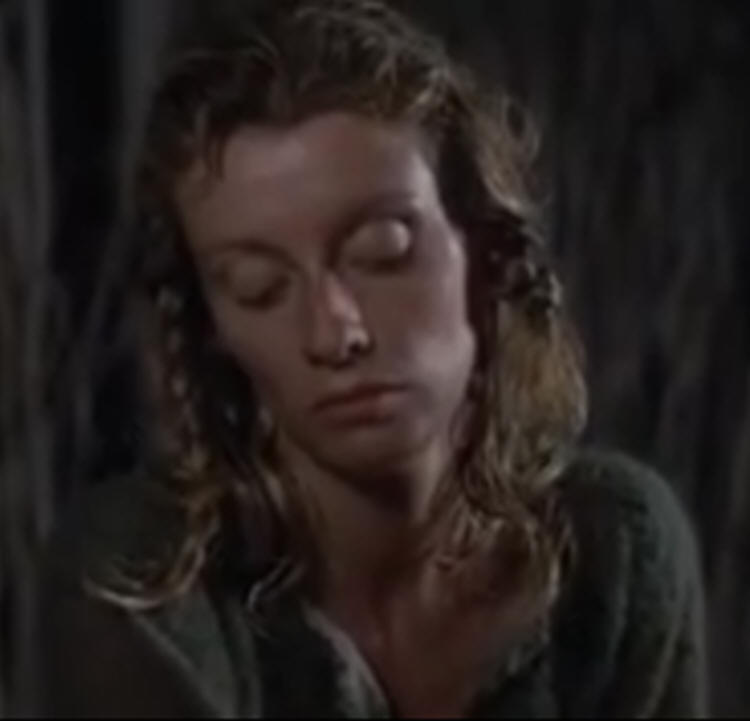
She looks better without her make-up.
She ends up loving Caine and wants to be with him, but despite
this she helps Caine
and his son to escape. Actually quite touching in an otherwise
listless film.
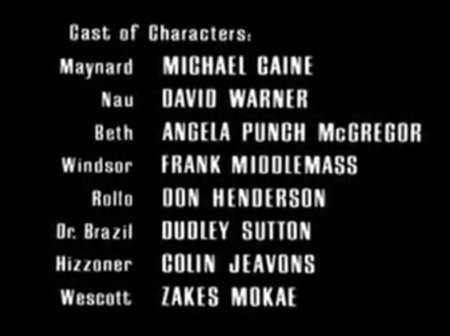
All images from the film.
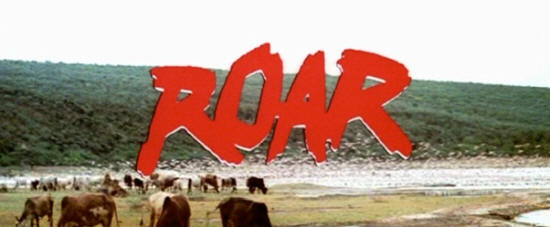
Roar starring Tippi Hedron, known for Hitchcock's The Birds and
Marni, and her daughter, a young Melanie Griffith with puppy
fat. The film centres round the family home in California with 132
lions, tigers, leopards, cougars and jaguars, plus an elephant and three
aoudad sheep (from
Tippi Hedron with Theodore Taylor, The Cats of Shambala, 1985,
chapter 17).
Noel Marshall, husband of Tippi, directs in 1981- it is his first film
as director and it shows.
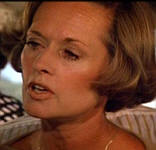
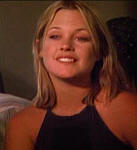
He does however walk among the lions, including
trying to stop a lion fight. His relationship with the lions is amazing.
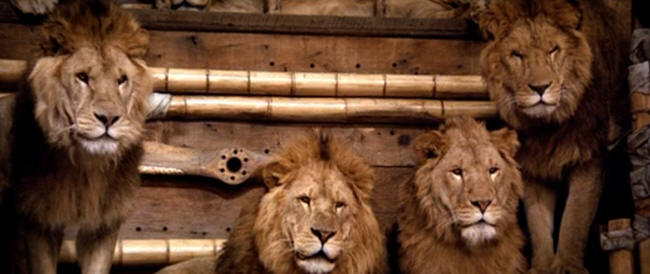
This is a sentimental film, made to raise funds
for Hedron´s Roar Foundation for animals at the Shambala Preserve. It comprises a
weak and silly plot mixed with footage of lions and tigers playing
with humans. Tippi Hedron writes "we soon realized that no scene involving
the animal cast could be directed to any extent. After setting up
situations, we would just roll three to six cameras and let happen what would
happen" (The Cats of Shambala, chapter 14).
The acting (of the humans) is at times incredibly bad. There
is a Hitchcock Birds reference as Hedron enters a room and birds fly away.
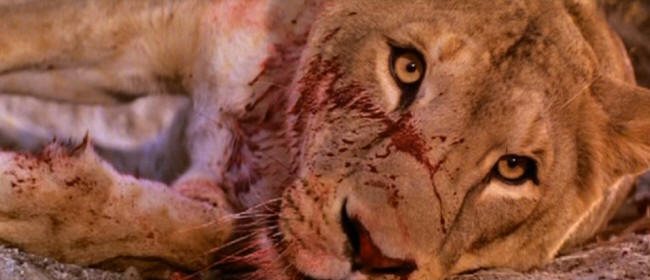
The only memorable scenes are of the lions after some have been slaughtered by hunters,
powerful imagery...
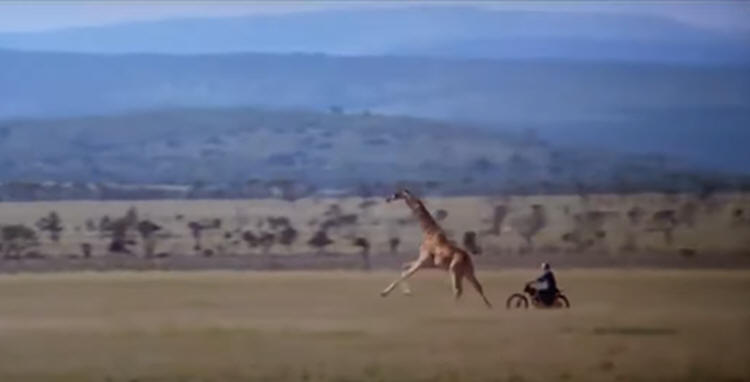
... and the opening, a motorbike being driven
through the plains racing a giraffe which of course easily wins. While
most filming was in California, for some locale shots they filmed in Kenya "On
the first day of photography, near the Matr River, which empties into Lake
Victoria, a huge giraffe gave us one of those precious gifts. Noel was on
a motorbike going from right to left across the screen, when the bull giraffe,
splitting off from the herd, decided to race the two wheeler. Galloping
joyously at thirty-five miles an hour, he kept up with the bike for almost a
quarter mile, head eighteen or nineteen feet in the air, providing us with
opening footage that would have been impossible to stage" (The Cats of Shambala
chapter 26).
If you like
lions it is worth buying, and the money goes to charity. No animals were
actually hurt during the film.
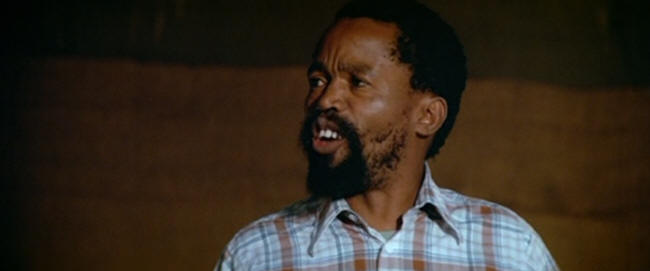
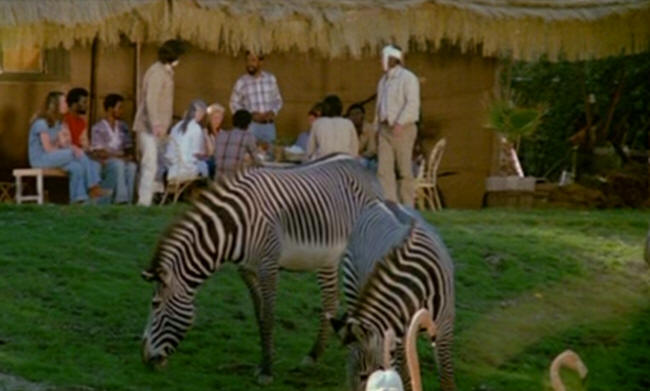
Zakes Mokae has a minor role as a committee member.
Sensibly he avoids the lions and his scenes are with zebras.
Cinematography is by Jan de Bont and editing by Ted Nicolaou. The music includes N'Chi Ya Nani (Whose Land Is This?) and Isn't
it Time by Robert Florczak.
"'Roar' is Marshall’s only film as a director, and his
inexperience shows, above all, in the incoherence of its tone. The movie
has an appropriately chaotic, and inescapable, quasi-documentary feel to
it, and the action is captured with a discerning and unflinching camera
eye by de Bont, a skilled and experienced cinematographer. But the story
is a blend of documentary and fiction, an autofiction that meshes family
life with a fabricated plot, and Marshall doesn’t quite seem aware of
the forms he’s using" (Richard Brody, The New Yorker, 22 April 2020,
click
here).
"I confess that, as a feline aficionado, I got what I wanted from
'Roar:' lots and lots of big cats. There's not much to the film beyond
that, though knowing that the film's hulking furry stars weren't trained
does add an element of suspense to an otherwise slack thriller. Still,
if you want to see cats chasing people in packs, falling over themselves
to descend stairwells, and jump up trees to swipe at disposable human
protagonists- you will probably enjoy 'Roar' " (Simon Abrams, Roger
Ebert site, 17 Apr 2015, click
here).
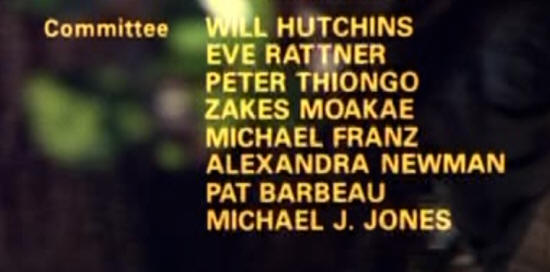
Mokae's name is misspelled in the credits.
All images from the film.

"all the black characters in the film reduced
to something very minor, very thin and characters where you don't get an
idea of at all" (John Matshikiza who plays Mapetla in the film
from the documentary
In Darkest Hollywood
directed by Peter Davis and Daniel Riesenfeld)
Cry Freedom directed by Richard Attenborough in 1988 about South African
black campaigner Steve Biko. It is based in the book by
Donald Woods, with Ronnie Taylor as Director of Photography.
"In 1969, Steve Biko and other black students frustrated with
white leadership in multi-racial student organizations formed an
exclusively black association. Out of the South African Students’
Organization (SASO) came what was termed Black Consciousness. This
philosophy redefined “black” as an inclusive, positive identity and
taught that black South Africans could make meaningful change in their
society if “conscientized” or awakened to their self-worth and the need
for activism… Articulate and charismatic, Steve Biko was one of the
movement’s foremost instigators and prolific writers. When the South
African government understood the threat Black Consciousness posed to
apartheid… Biko was banished to his home district in the Eastern Cape...
His death at the hands of security police in September 1977 revealed the
brutality of South African security forces and the extent to which the
state would go to maintain white supremacy" (Leslie Anne Hadfield, Steve
Biko and the Black Consciousness Movement, 27 Feb 2017, Oxford Research
Encyclopedias, click
here).
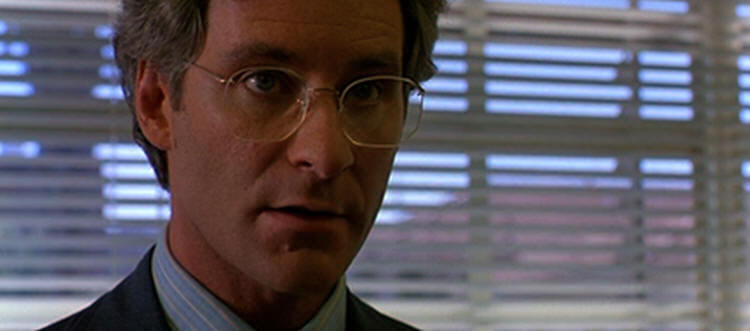
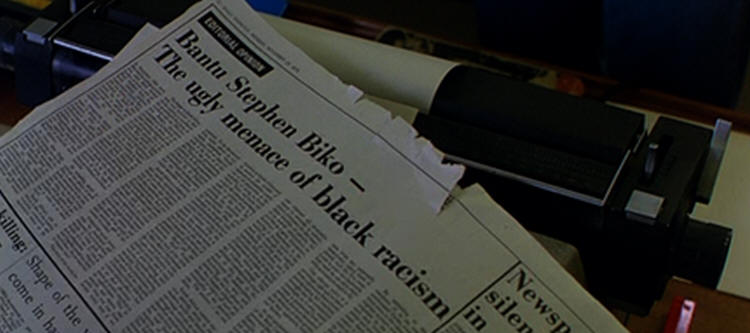
Donald Woods, played by Kevin Kline, was an editor in South Africa
and viewed Biko, Denzel Washington, as a black racist.
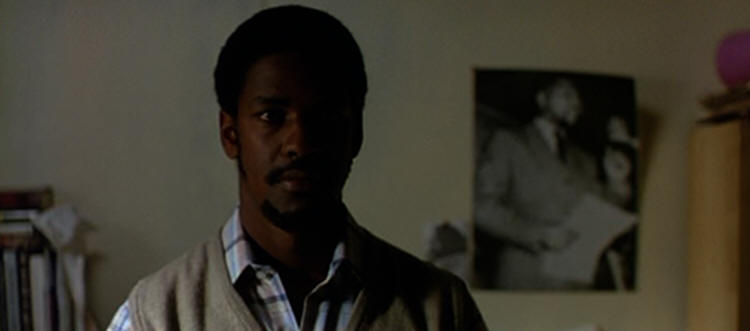
He is persuaded to meet Biko who is in internal exile. Woods
is impressed by the intelligence of Biko, and his desire for a South
Africa where all people were treated equally.
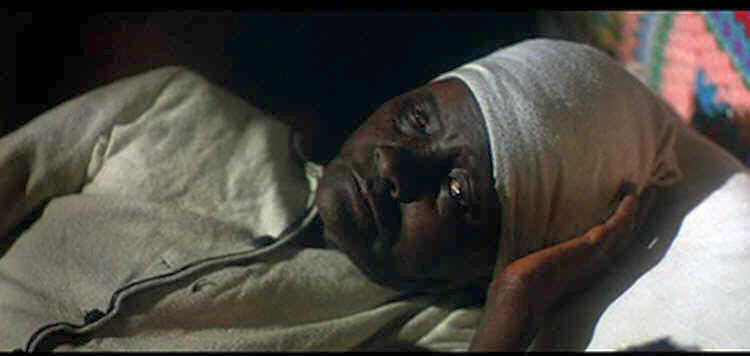
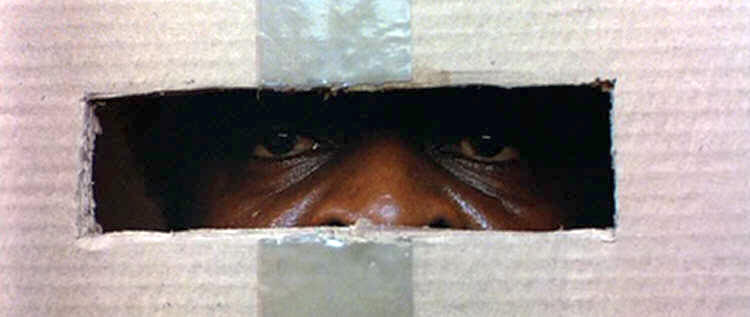
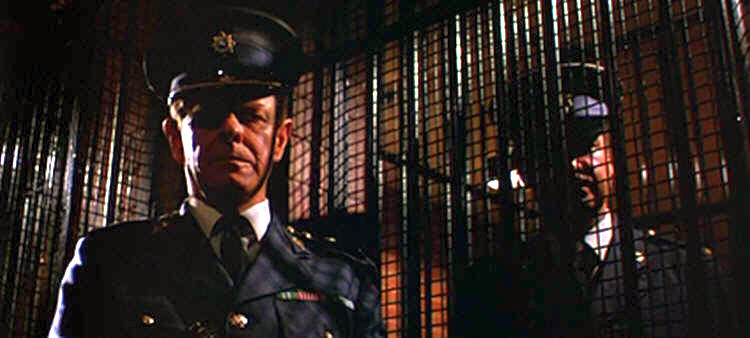
Poverty in the townships, informers testifying from a large
cardboard box, and the police enforcing apartheid.
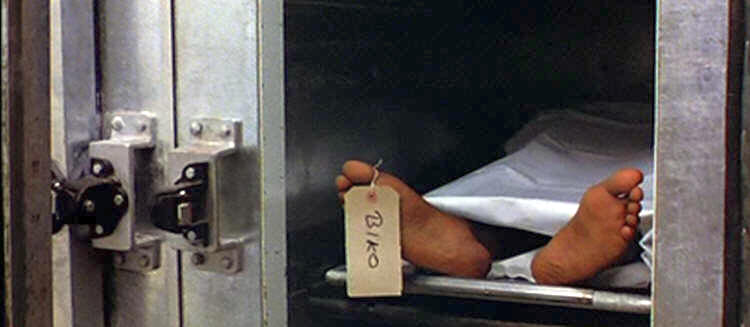
Biko is captured and murdered, though this is covered up.
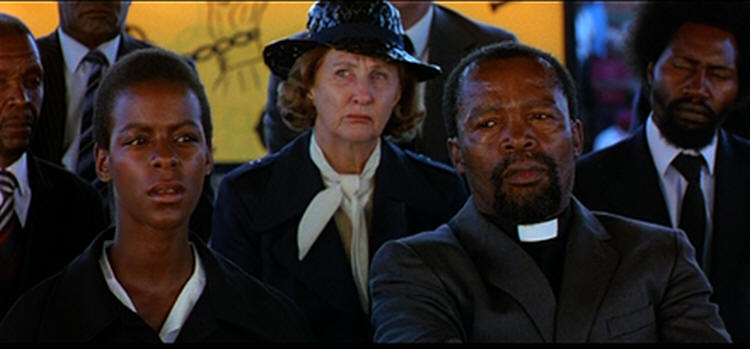
Mokae as Father Kani at Biko's funeral. He later guides
Kline to the border with Lesotho where Kline can escape
the South African authorities and publish his book exposing the murder
of Biko.
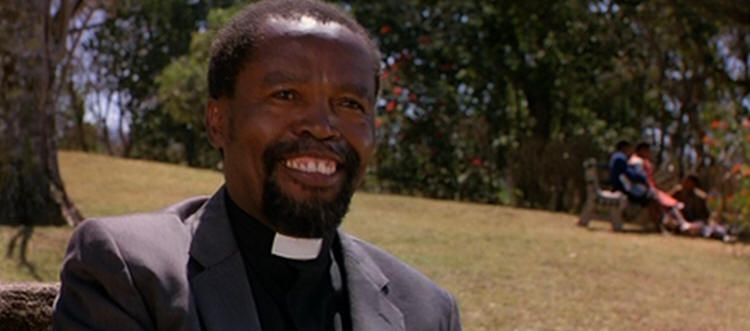
The riot scenes are magnificently
and hauntingly filmed, and Denzel Washington plays Biko
with deep intelligence.
A major flaw of the film is that despite its subject (Biko)
Attenborough concentrates on the white perspective, just as he did in
Gandhi.
It says it all when Denzel Washington in the title role was
nominated for an Oscar in the Best Supporting
Actor category.
"...far from being the Steve Biko story, what was settled on was
the Donald Woods story... It perpetuates the image of the African as
victim, someone whose fate is in the bands of others" (Peter Davis, In
Darkest Hollywood, 1996 chapter 5).
""CRY FREEDOM,' a black friend from South Africa tells me, 'may be a
useful movie, at least for the moment. But it is not a truthful one.' He
knows. He was one of the defendants in the trial depicted in the film at
which Steve Biko was a defense witness. Convicted, my friend spent
nearly eight years in Robben Island prison... what has been
misappropriated is the truth about the black struggle. One has only to
read Biko's famous essay, "Black Souls in White Skins?'... to grasp that
the radical cutting edge of the hero's views has been dulled to make
them palatable to Attenborough's intended white audience of millions.
The film Biko waggishly chastises the country's liberals. But neither
his analysis nor his remedy is ever threatening or even particularly
challenging... Attenborough has made his black protagonist a stick
figure whose only triumph is one white man's putative emancipation. He's
also made the black masses undifferentiated and faceless. This in an
antiapartheid film! No wonder the Botha government is so unfazed that it
has allowed Cry Freedom to be shown without cuts" (Martin Peretz, 21 Dec
1987, The New Republic).
"Although 'Cry Freedom'' has sweeping, scenic good looks and two fine
performances to recommend it, not to mention the weight of moral decency
on its side, what comes through most strongly is the ponderousness of
the Attenborough style... [the film] in fact makes relatively
little of Steve Biko himself, allowing him to disappear before the film
is even half over... it is most unfortunate that this film, with its
potential for focusing worldwide attention on the plight of black South
Africans, should concentrate its energies on a white man" (Janet Maslin
in New York Times, 6 Nov 1987).
Another Zakes Mokae film also tackling apartheid in South Africa
is A Dry White Season and here while white men try to resolve injustice,
the character of Mokae is always present and is the person who carries
out the decisive act concluding the film.
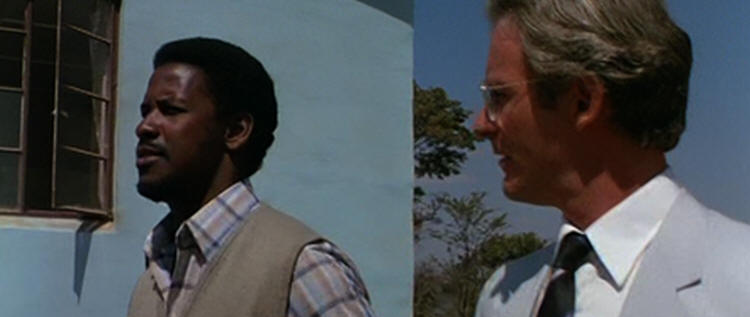
"The film ''Cry Freedom'' opened in more than 30 South African
theaters today with censors' approval, but the police said it threatened
public safety and seized copies of the film seven hours later… The
Minister of Information, Stoffel van der Merwe, said the Government
decided to override the board because the censors could not judge ''the
situation on the streets.'' ''The security forces are portrayed in such
a negative light that their public image would be seriously
undermined,'' he said. ''Whites are typified as privileged and
surrounded by wealth, as opposed to blacks living in great poverty and
subjected to exploitation and repression.'' Mr. Van der Merwe said those
portrayals were not accurate" (Cry Freedom' Seized by South African
Police, New York Times, 30 Jul 1988).
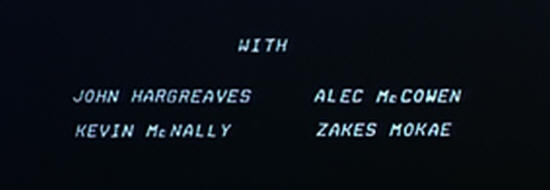
All images from the film.
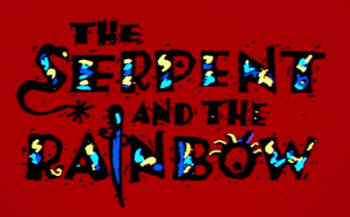
The Serpent and the Rainbow directed by Wes Craven in 1988. One of
Zakes Mokae's great horror roles.
Dennis Allen (played by Bill Pulman) is sent to Haiti by a major
pharmaceutical corporation to investigate reports of a dead person
coming to life. He meets Dr Marielle Duchamp (Cathy Tyson) and of
course they fall in love.
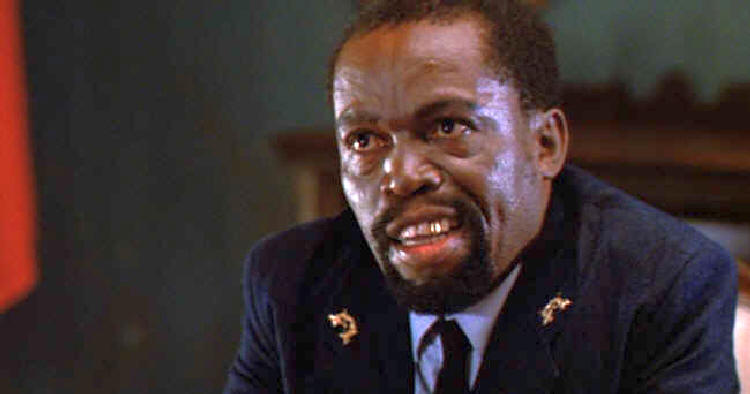
But Haiti is under the power of the Duvalier dictatorship, and the
head of the paramilitary Tonton Macoute, led by Zakes Mokae- in
The Comedians he is also in the Tonton Macoute.
Allen quickly comes against the power of voodoo.
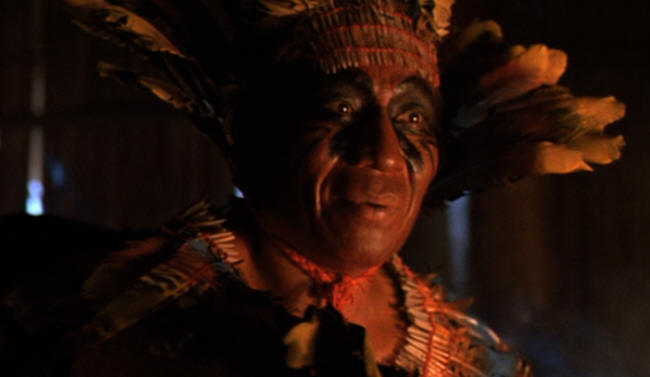
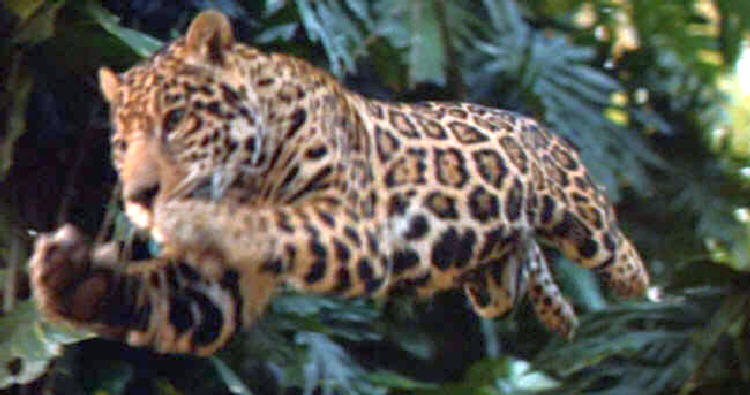
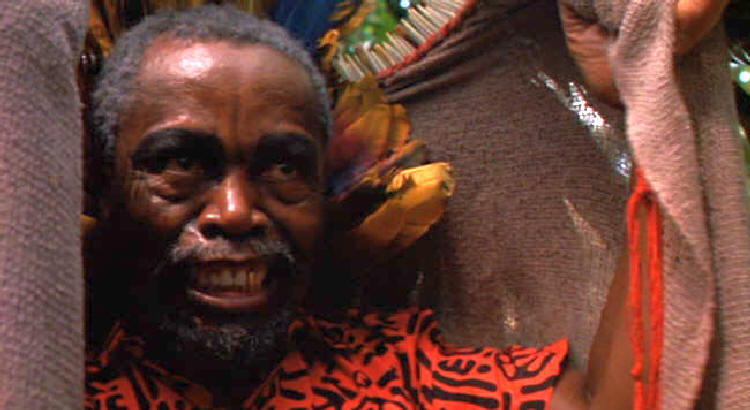
Allen investigates and find Christophe (Conrad Roberts) who was
certified dead and buried, but walks and talks.
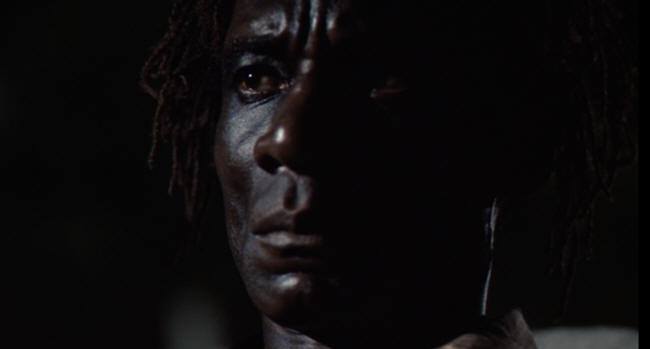
Zakes Mokae has Allen taken to headquarters, and as they talk Allen
can hear the screams of people being beaten.
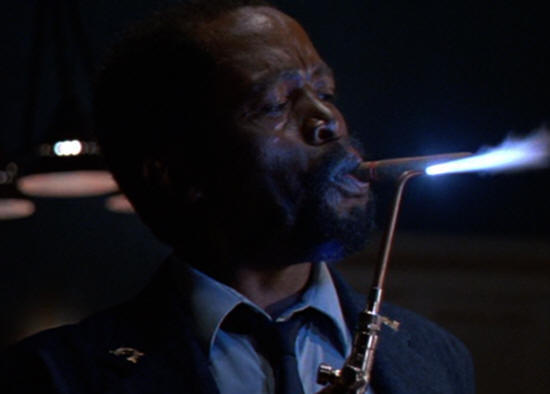
Mokae warns Allen off, lighting his cigar with a blowtorch.
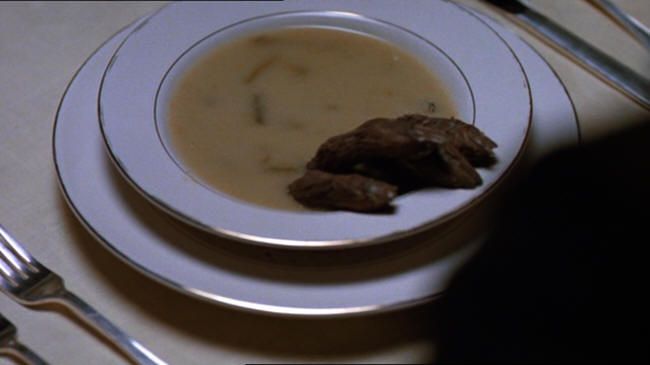
Allen returns to America, but even when having a
meal he discovers Mokae's voodoo can still reach him from the soup dish.
A powerful film by Wes Craven and a memorable and terrifying role by
Zakes Mokae.
"The most striking performance, though, comes from South African-born
Zakes Mokae as the police chief, grinning malevolently through
gold-capped teeth as he contemplates some juicy atrocity" ( Geoff Brown,
The Times, 20.Apr 1989).
"Zakes Mokae is especially memorable as Alan's chief
antagonist, the head of the dreaded Tontons Macoute security force, who
displays menacingly bared teeth at all times, even when speaking - with
the greatest sarcasm imaginable - of ''happy, happy, happy island
people" (Janet Maslin, New York Times 5 Feb 1988).
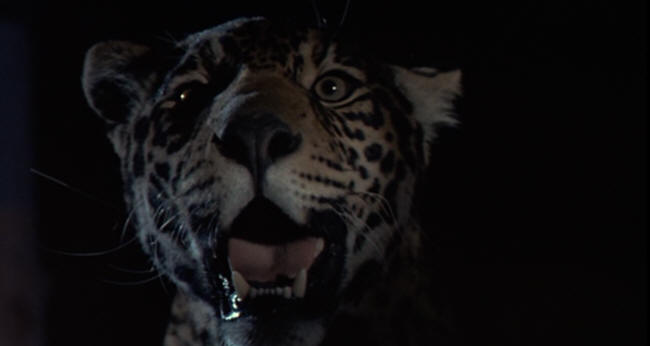
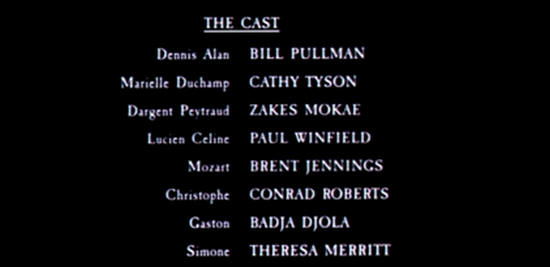
All images from the film.
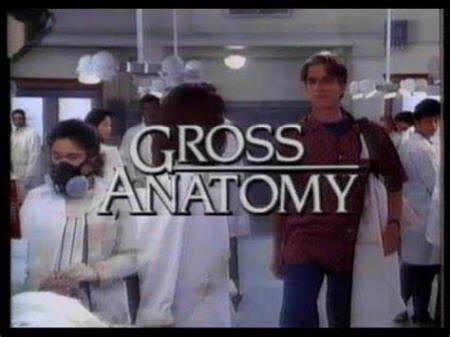
Gross Anatomy directed by Thom Eberhardt in 1989. Also called A Cut Above. A medical student comedy
with four
students working together on the same corpse for a year. A predictable story- the first time they have to cut open a
body, the long hours of study, the student being expelled, falling in love- but it is a pleasant comedy.
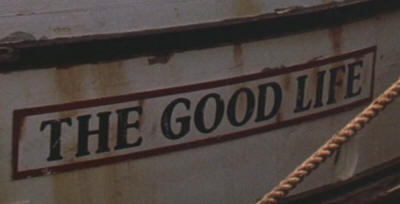
Joe Slovak (Matthew Modine- he was in Full Metal Jacket) comes from a
poor family and want to be a doctor to earn lots of money. His
father is a fisherman and the boat, The Good Life, sums up Joe's
attitude to life.
 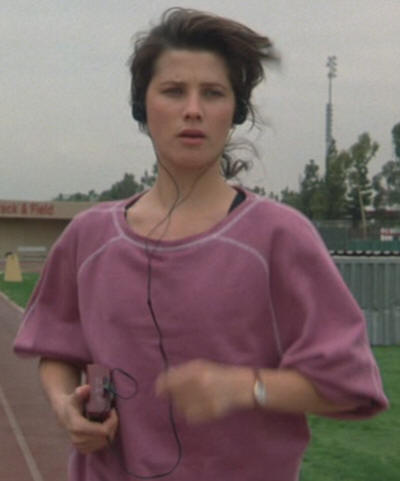
Laurie (Daphne Zuniga) is a fellow student and of
course they end up together.
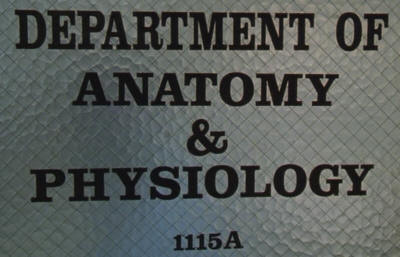
Mokae is Dr. Banumbra of the anatomy lab, initially as awesome as the bodies on the tables.
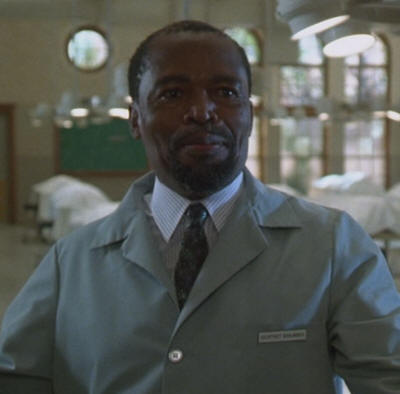
"Despite its less than promising title and its
occasional stock touches, ''Gross Anatomy'' is a mostly funny and
engaging look at Joe's first med-school year. Its focus is the anatomy
lab, where Zakes Mokae, in a smallish role as one of Joe's teachers,
presides with fiendish glee" (Janet Maslin, New York Times, 20 Oct
1989).
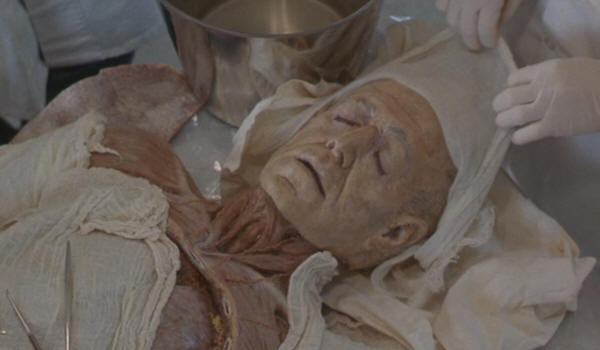
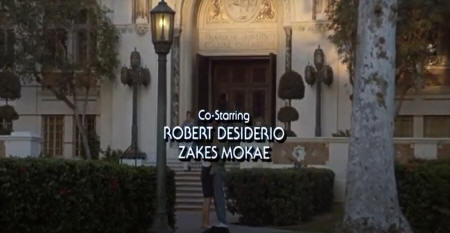
All images from the film.
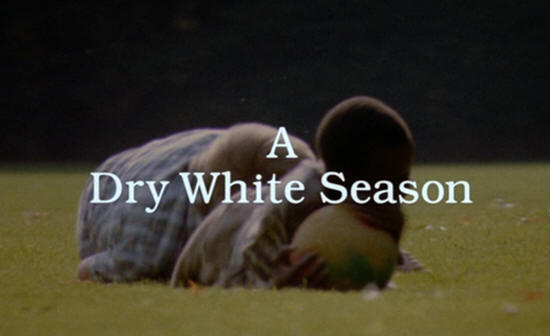
"There's nothing that is not true in
this picture and I know from experience. I know what it is to be
in a cell and to be beaten" (Zakes Mokae from the documentary
In Darkest Hollywood
directed by Peter Davis and Daniel Riesenfeld,
1993)
A Dry White Season directed by Euzhan Palcy in 1989 of an Andre Brink novel starring Donald Sutherland,
Marlon Brando and Zakes Mokae. The film tackles the apartheid
regime in South Africa, filmed during the apartheid days but filmed in
Zimbabwe. Andre Brink says of the novel "that created a lot of
security police interest in me" (from In Darkest Hollywood).
Palcy says she wanted to make a political film but avoiding being
political and polemical (from DVD extras). The film is the first
picture directed by a black woman to be released by a major Hollywood
studio (A Dry White Season: Justice Against the Law, Jyoti Mistry, 11
Dec 2018 from The Criterion Collection website, click
here).
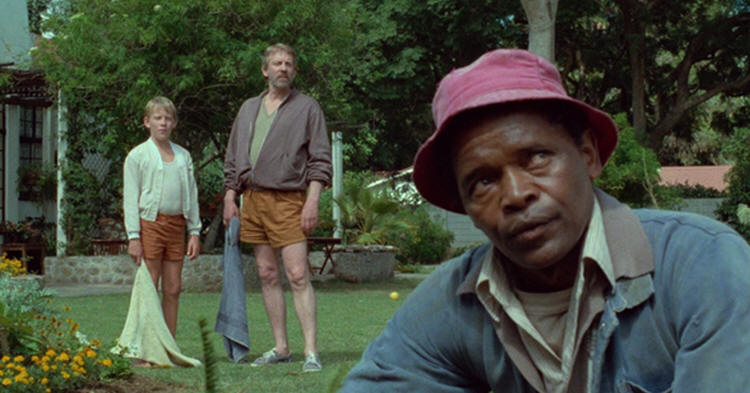
Fugard veterans Winston Ntshona and John Kani also appear. Ntshona (above) is
the gardener Gordon Ngubene whose son is beaten by police. His white boss
Ben du Toit (Sutherland) is a South African liberal but tells him to let it go,
"There is really nothing more we can do".
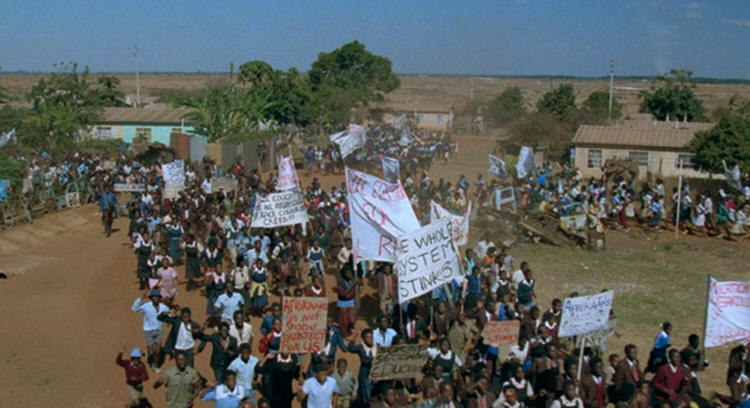
Gordon's son takes part in a march by black South African children who
protest against Afrikaans, the language of the white Afrikaners, being
introduced in black schools.
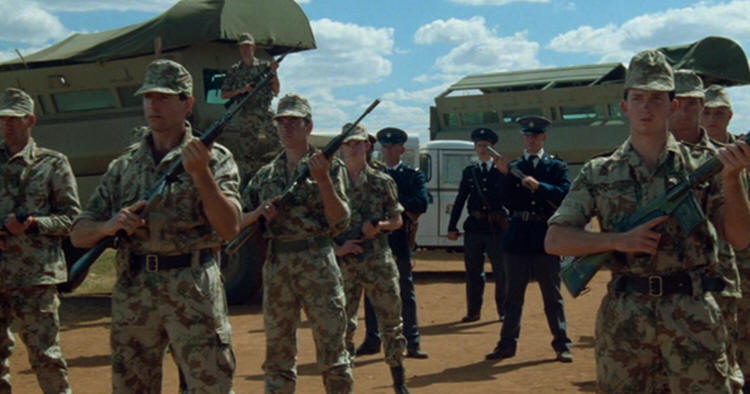
The peaceful demonstration is met by armed soldiers and police who fire
on the children, with Gordon's son one of the killed.
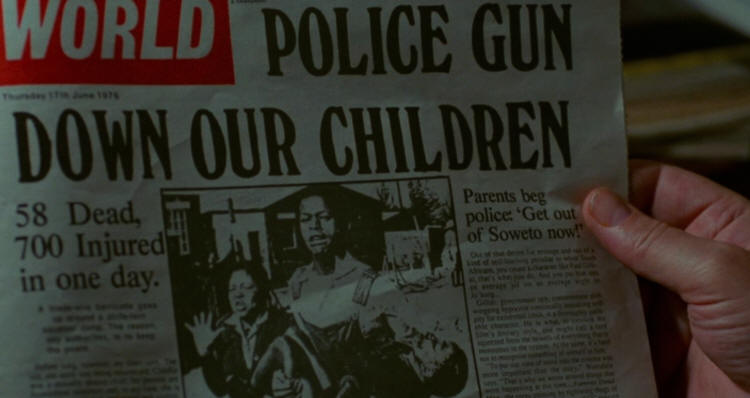
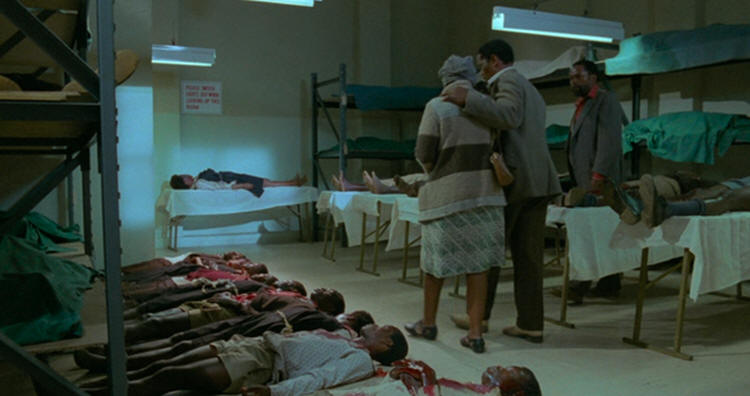
Gordon and his wife Emily (Thoko Ntshinga) search the mortuary for their
son's body. Emily's friend Stanley Makhaya (Zakes Mokae) helps.
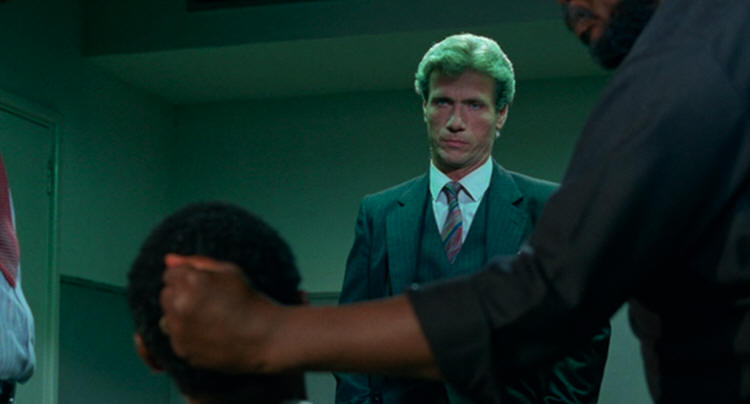
Gordon's search for his son's body leads to his arrest and torture
under supervision of the menacing Captain Stolz (Jürgen Prochnow).
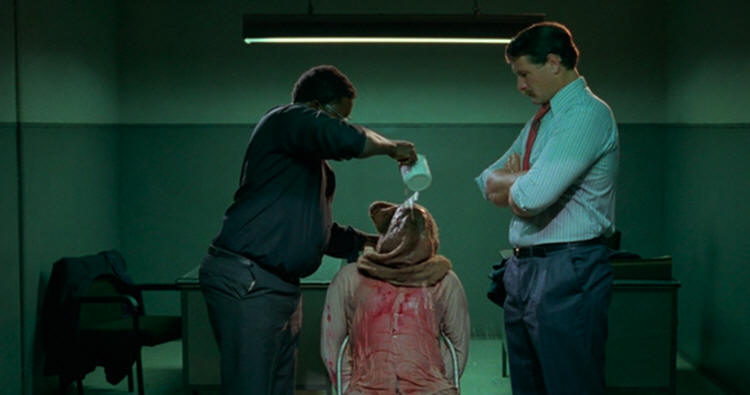
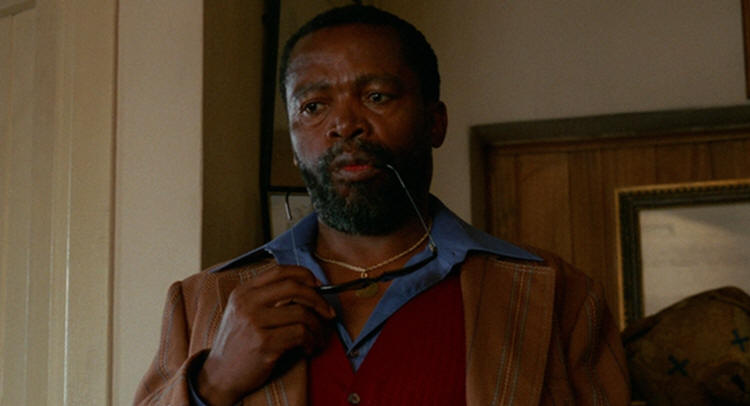
Mokae plays a taxi driver and is looking to document and publicise the
crime against Gordon and his son.
Sutherland tells Mokae there is still hope and
Mokae replies "Hope is a white word. It is not hope we need".
Mokae is on top form in the film. Euzhan Palcy says "[in in scene he] is supposed to be crying… he
couldn’t cry, Zakes Mokae said he couldn’t cry. So we tried everything
and time was running. So I said OK we stop everything and stay put, and
I walk outside with him, and I say tell me, what is going on? He said, I
don’t know, I can’t cry. I say, OK, you are South African, I know that
they killed your brother, they tortured hum, they hanged him, and they
said that he committed suicide. You remember when you got the news how
you felt about this, and he said “yes”, and I said I want you to go back
and when you get to your scene you see your brother and you remember
that emotion. And that’s exactly what he did and he was crying like
crazy." (Ava DuVernay in discussion with Euzhan Palcy, The Root, 22
Oct 2020
here).
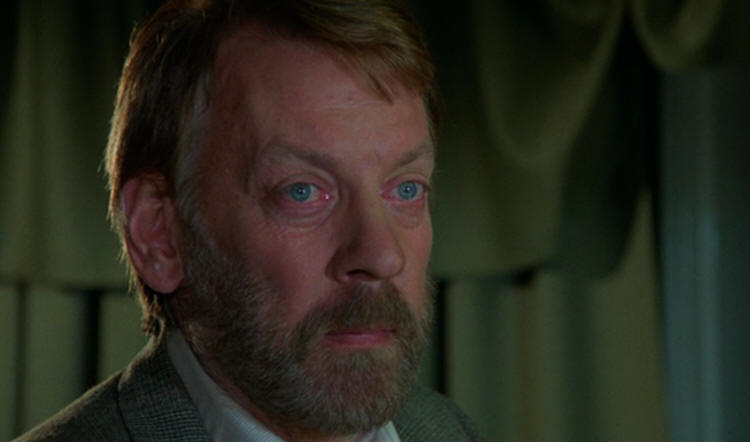
Sutherland the white liberal realises the realities of apartheid "I
went along with them, I believed their lies".
He hires civil right lawyer Ian McKenzie (Marlon
Brando) and asks for justice under the law. Brando replies "You
see, justice and the law... I suppose they could be described as distant
cousins, and here in South Africa they are simply not on speaking
terms".
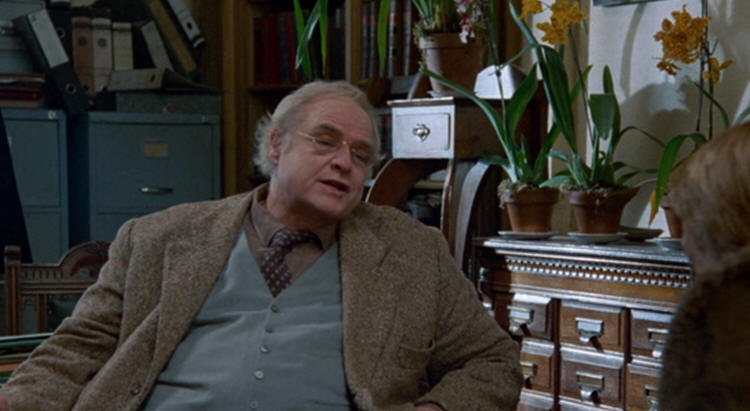
Brando gives a memorable performance. He so
liked the film script he agreed to appear without payment- Sutherland
says in an interview "They phoned me up and said Marlon is doing it for
nothing and they are going to offer you enough to eat" (interviewed on
NBC Today in 1989 from DVD extras). Both Brando and Sutherland as
well as A Dry White Season novelist Andre Brink mention Palcy's film
Sugar Cane Alley (Rue Case Negres) as reasons for wanting to work with
Palcy.
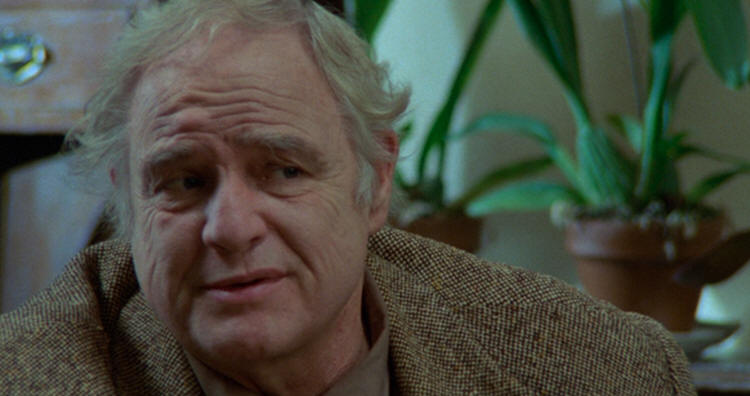
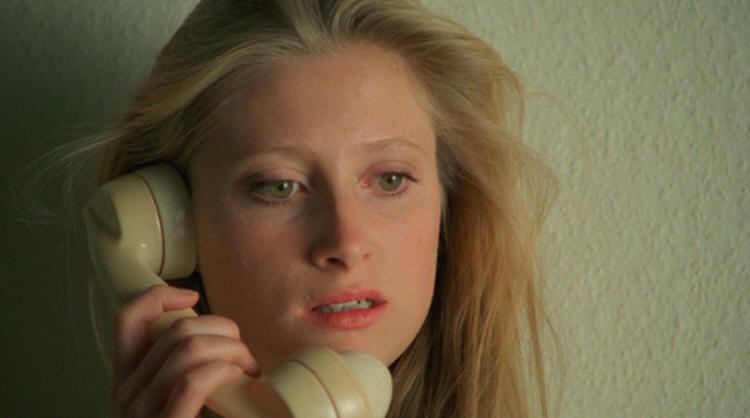
The film shows two families torn apart, black
Gordon's family where his son is killed, he is tortured and killed, and
his wife Emily is killed, and white Du Toit's family torn between
wanting to change the system (Du Toit and his son) and his wife and
daughter who fear a black revolution and are prepared to betray him if
necessary.
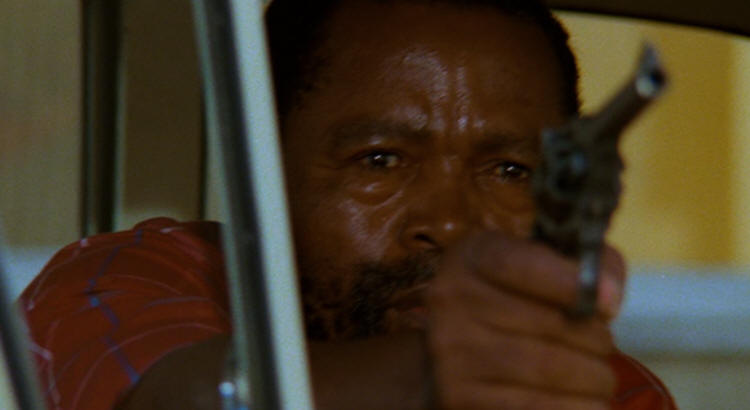
Stanley (Mokae) finally confronts Captain Stolz.
"Zakes Mokae acts with fire and dignity as Stanley, the gardener's
friend who leads Du Toit to the truth" (Geoff Brown, The Times, 18 Jan
1990).
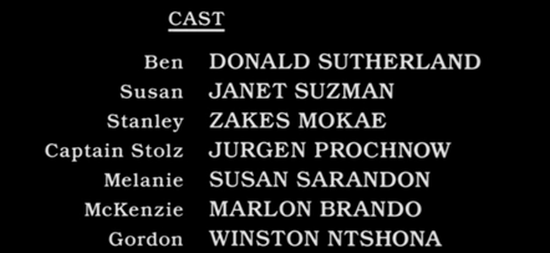
All images from the ilm.
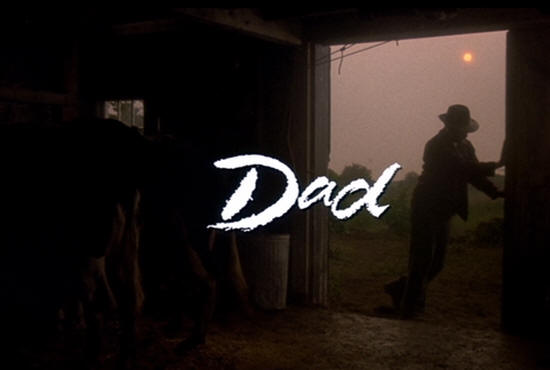
Dad directed by Gary David Goldberg with Jack Lemmon, and Kevin Spacey
and a young Ethan Hawke (his third feature length film) in relatively small roles. 1989.
Given the available talent the film wastes their abilities. Jan
Kiesser is Director of Photography, and the film is based on a book by
William Wharton who previously wrote the novel Birdy.
A sentimental film with the
father approaching death and the son realises how he has neglected his
father and his own son, and builds up the family again.
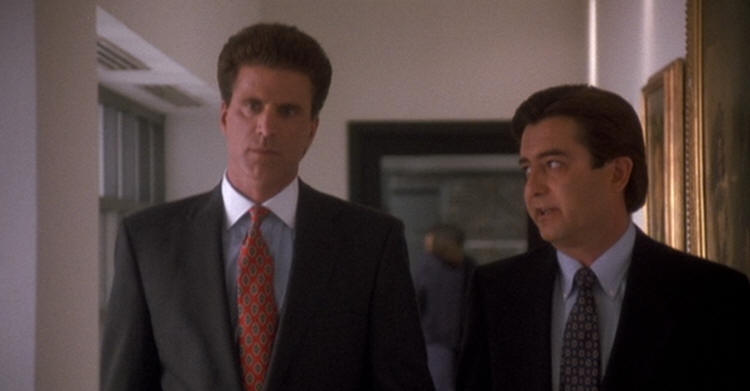
The characters are
predictable, the businessman (Ted Danson, left) who neglects his family...
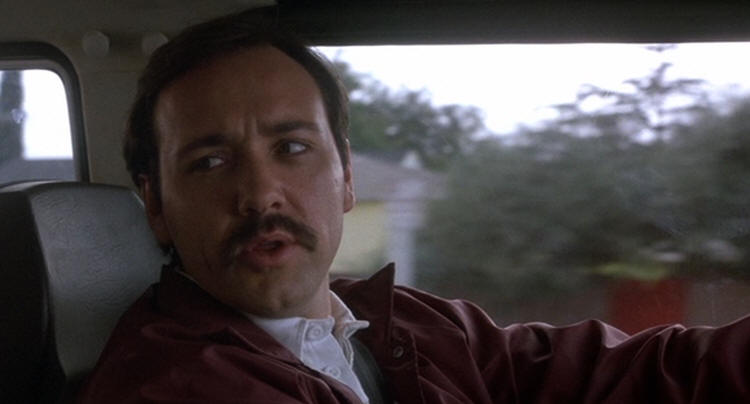 ...and his less
successful brother, Kevin Spacey, who has little script development to work with.
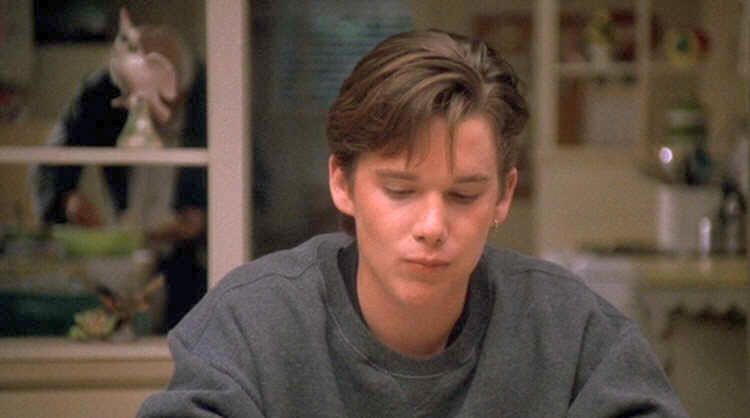 A young Ethan Hawke is also underused.
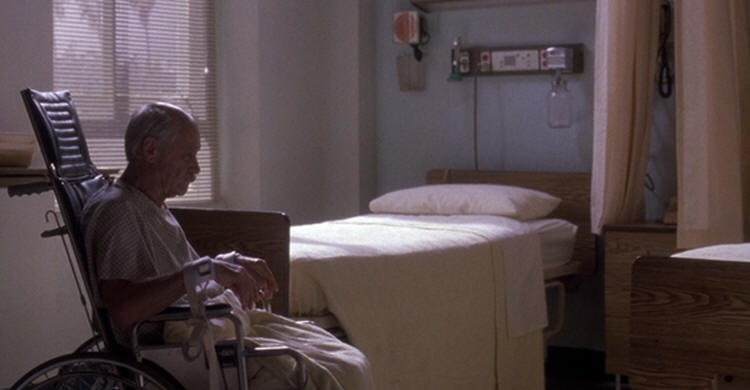 Jack Lemmon is the
elderly dad who has health issues and enter hospital under the treatment
of unsympathetic doctors. One scene shows the grandfather bound to
his wheelchair like a prisoner, which leads to the dad/son carrying him
out the hospital.
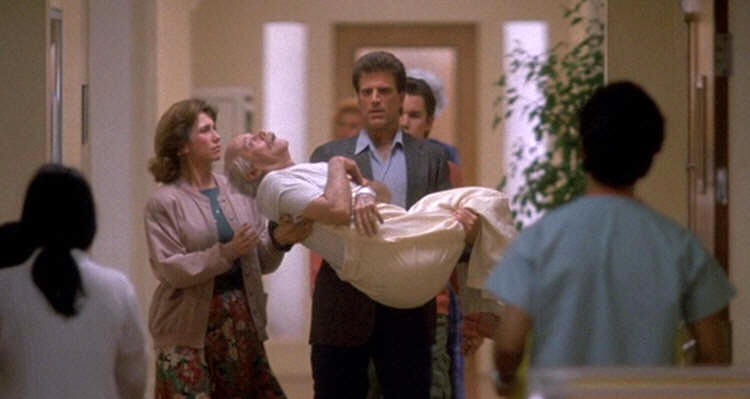
"What are we to make, for example, of the scene where Danson grows
angry with the hospital treatment Dad is receiving and literally picks
up his father and carries him out of the hospital and takes him home?
The filmmakers no doubt thought this would be an emotionally shattering
scene, but they got carried away by their own zeal. No one who has seen
an elderly parent through major surgery could believe the scene for a
moment; such an experience would cause the patient excruciating pain and
might kill him" (Roger Ebert, 27 Oct 1989, click
here).
"...the soft-headed screenplay somehow permits the members of the
cast to give good performances and, in Mr. Lemmon's case, a performance
that is often something of a wonder... People smile through tears to the
point where a fire hose would seem to be the only way to bring them back
to reality. It has two too many potentially fatal illnesses and maybe a
half-dozen too many scenes in which one family member clutches another
family member and says, ''I love you.'.. The rest of ''Dad'' is composed
of a series a harrowing situations about terminal illnesses and family
relationships that sound more and more phony as the film becomes more
serious" (Vincent Canby, New York Times, 27 Oct 1989).
Mokae is the sympathetic Dr Chad who realises how impersonal hospitals can be.
Mokae later worked with Spacey on Outbreak. Mokae is
probably the only good thing in the film (but I might be biased).
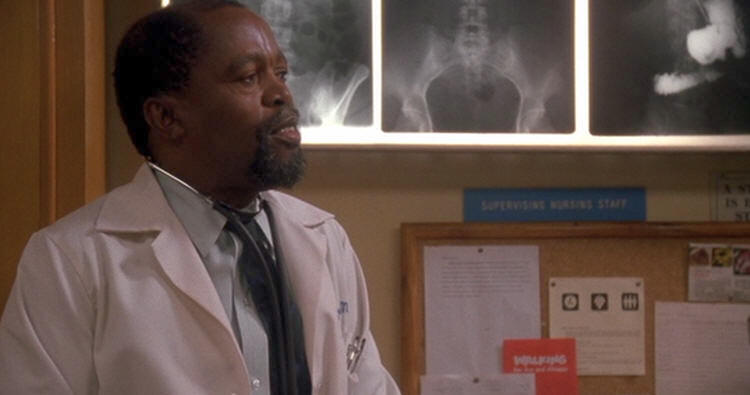
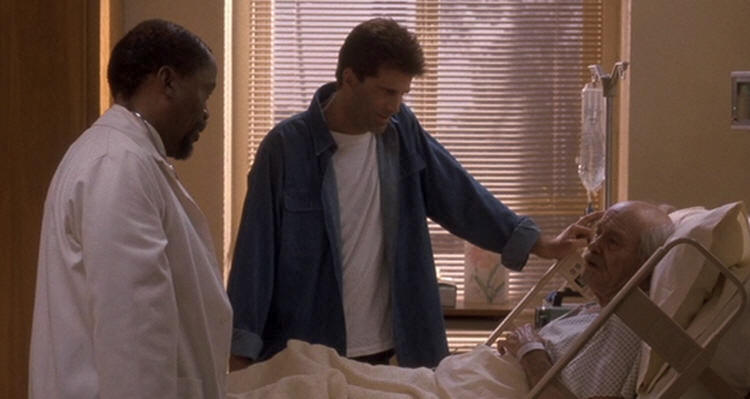
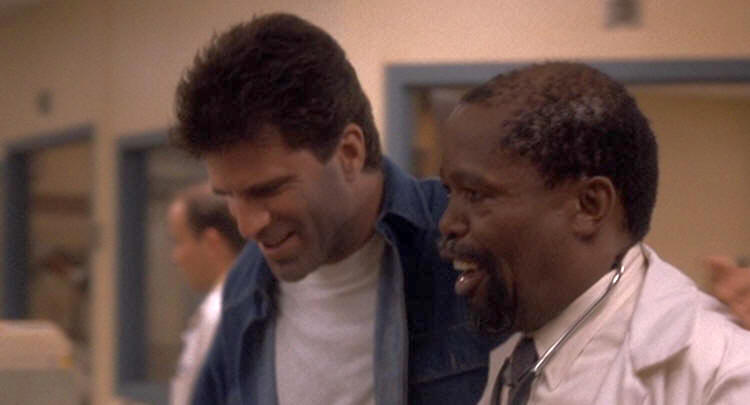
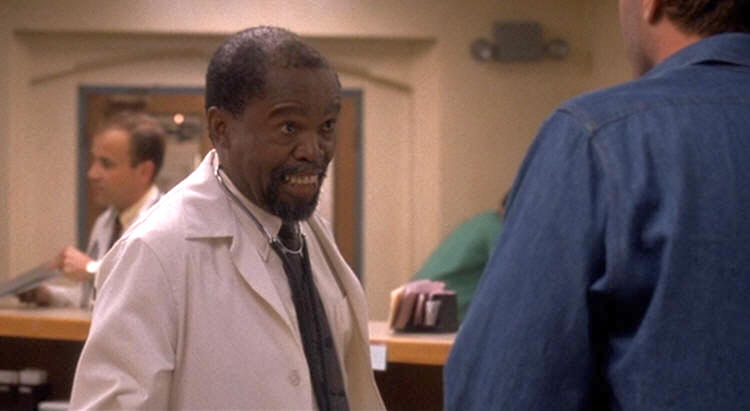
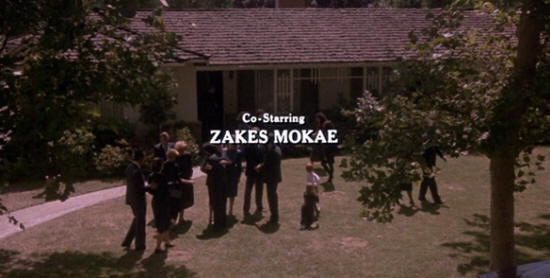
All images from the film.
|













































































